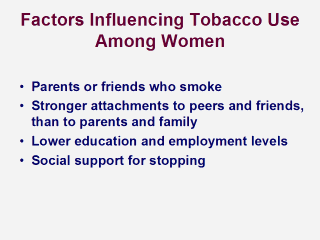 |
Girls who
initiate smoking are more likely than those who do not smoke to have parents
or friends who smoke. They also tend to have weaker attachments to parents
and family and stronger attachments to peers and friends. They perceive
smoking prevalence to be higher than it actually is, are inclined to risk
taking and rebelliousness, have a weaker commitment to school or religion,
have less knowledge of the adverse consequences of smoking and the
addictiveness of nicotine, believe that smoking can control weight and
negative moods, and have a positive image of smokers.
Women who continue to smoke and those who fail at attempts to
stop smoking tend to have lower education and employment levels than do
women who quit smoking. They also tend to be more addicted to cigarettes, as
evidenced by the smoking of a higher number of cigarettes per day, to be
cognitively less ready to stop smoking, to have less social support for
stopping, and to be less confident in resisting temptations to smoke.
|
